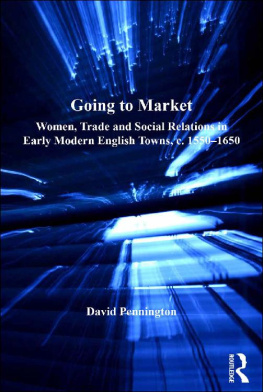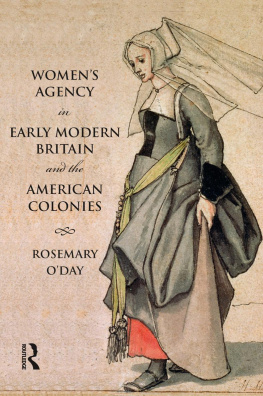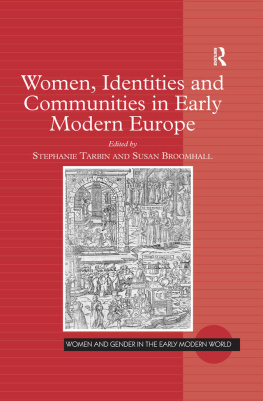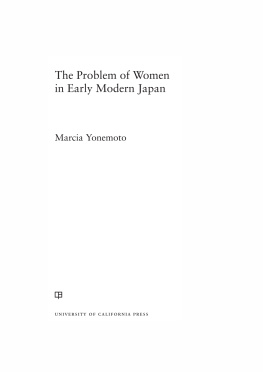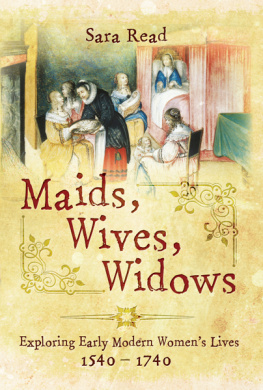GOING TO MARKET
For Karin
Going to Market
Women, Trade and Social Relations in Early Modern English Towns, c. 15501650
DAVID PENNINGTON
Webster University, St. Louis, USA

First published 2015 by Ashgate Publishing
Published 2016 by Routledge
2 Park Square, Milton Park, Abingdon, Oxon OX14 4RN
711 Third Avenue, New York, NY 10017, USA
Routledge is an imprint of the Taylor & Francis Group, an informa business
Copyright David Pennington 2015
David Pennington has asserted his right under the Copyright, Designs and Patents Act, 1988, to be identified as the author of this work.
All rights reserved. No part of this book may be reprinted or reproduced or utilised in any form or by any electronic, mechanical, or other means, now known or hereafter invented, including photocopying and recording, or in any information storage or retrieval system, without permission in writing from the publishers.
Notice:
Product or corporate names may be trademarks or registered trademarks, and are used only for identification and explanation without intent to infringe.
British Library Cataloguing in Publication Data
A catalogue record for this book is available from the British Library
The Library of Congress has cataloged the printed edition as follows:
Pennington, David, 1977
Going to market : women, trade and social relations in early-modern English towns, c. 15501650 / by David Pennington.
pages cm.(The history of retailing and consumption)
Includes bibliographical references and index.
ISBN 978-1-4724-4370-0 (hardcover)ISBN 978-1-3155-8539-0 (ebook)ISBN 978-1-3171-2615-7 (ePub) 1. Women merchantsEnglandHistory16th century. 2. Women merchantsEnglandHistory17th century. 3. Women merchantsEnglandSocial conditions. 4. WomenEnglandEconomic conditions. 5. MarketsEnglandHistory. 6. HouseholdsEconomic aspectsEnglandHistory. 7. City and town lifeEnglandHistory. 8. EnglandCommerceHistory16th century. 9. EnglandCommerceHistory17th century. 10. EnglandSocial conditions. I. Title.
HF3515.P36 2015
381.0820942dc23
2015009330
ISBN: 9781472443700 (hbk)
ISBN: 9781315585390 (ebk-PDF)
ISBN: 9781317126157 (ebk-ePUB)
Contents
List of Tables
The History of Retailing and Consumption General Editors Preface
It is increasingly recognized that retail systems and changes in the patterns of consumption play crucial roles in the development and societal structure of economies. Such recognition has led to renewed interest in the changing nature of retail distribution and the rise of consumer society from a wide range of academic disciplines. The aim of this multidisciplinary series is to provide a forum of publications that explore the history of retailing and consumption.
Gareth Shaw, University of Exeter, UK
Acknowledgments
This project began its life as a rather hastily written, and not entirely convincing, graduate seminar paper. That it has reached its current incarnation as a book is testimony to the wonderful support I have received over the years. Research and writing was made possible by funds provided by a Washington University dissertation writers grant, various Washington University summer research grants, and professional development funds provided by Webster University, St. Louis. Washington Universitys Dissertation Writers Workshops and Early Modern Reading Groups have provided pleasant and collegial forums for me to share chapter drafts at various stages of development. I also thank the journal Seventeenth Century, through its website of this book. At early stages of research, Alice Wolfram, Alexandra Shepard, and Craig Muldrew provided advice on how to navigate the archives; and the impeccable helpfulness and efficiency of the staffs of various English archival offices and, in particular, the Cambridge University Archive, made research a productive and rewarding experience. Id also like to thank my colleagues at Webster University in the department of History, Politics, and International Relations for their friendliness and encouragement. Our department is located in a big, old house built by the inventor of Tums, but our departmental atmosphere is such that I take surprisingly few antacids.
A number of individuals have been crucial in helping me improve this book. Christine Johnson provided advice on several chapters; she and Tim Parsons taught me much about the craft of historical research and writing. Daniel Bornstein generously provided detailed editorial commentary on the dissertation upon which this book is based. Above all, my greatest intellectual debt is to Derek Hirst, who was unflagging in his willingness to read and comment on chapter draft after chapter draft. Without his advice, my writing would have much less clear, and my arguments would have been much less sharp. I can hardly thank him enough. I alone am responsible for any lingering mistakes.
I also owe a great many debts to family and friends for providing much needed moral support. Matt Brown, Jill Storm, and Chris Pepus helped make scholarly endeavors fun at a crucial time. My parents were my first, and remain, my greatest teachers; this book would not be possible without them. My sons, Henry and Oliver, remind me that there are things in life even more important than finishing a book. Finally, my wife Karin knows all too well the perils of living with an anxious, distracted author. Throughout she has provided me with love and support for what many times I feared was a quixotic quest. Thats why I dedicate the book to her.
List of Abbreviations
|
|---|
APC | Acts of the Privy Council |
BL | British Library |
Bodl. Lib. | Bodleian Library, Oxford University |
BrRO | Bristol Record Office |
c. | contra |
CKS | Centre for Kentish Studies, Maidstone |
CUA | Cambridge University Archive |
DRO | Dorset Records Office, Dorchester |
EcHR | Economic History Review |
ERO | Essex Record Office, Chelmsford |
ESRO | East Suffolk Record Office, Ipswich |
HampRO | Hampshire Record Office, Winchester |
HertRO | Hertfordshire Record Office, Hertford |
HMC | Historical Manuscripts Commissions, Reports |
JP | Justice of the Peace |
LMA | London Metropolitan Archives |
OED | Oxford English Dictionary |
OUA | Oxford University Archive |
P&P | Past and Present |
Pepys Ballads | Hyder Edward Rollins (ed.), The Pepys Ballads (8 vols, Cambridge, Mass.: Harvard University Press, 1929-1932) |
PRO | Public Record Office, Kew |
Rox. Ballads | W.M. Chappell and J. Woodfall Ebsworth (eds), The Roxburghe Ballads (8 vols, London and Hertford: The Ballad Society, 18711897) |
SCA |
Next page
